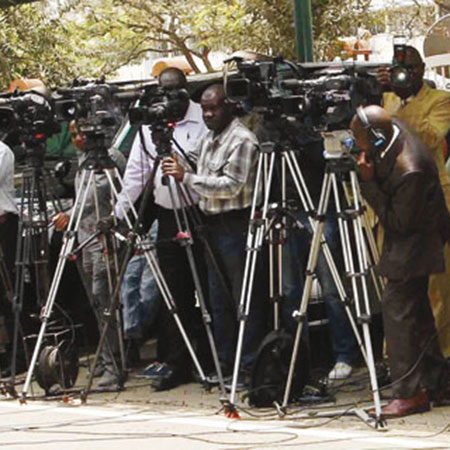
There is a general, but fallacious view in this country that we have a very strong and responsive media. Journalists, media owners and even the general public live under this illusion. This mirage has sent to sleep even those who should remain awake to the fact that our media is one of the weakest aspects of our fledgling democracy The lullabies we sing about the strength of our media have induced a complacence of unimaginable proportions as the lords of mediocrity dance with joy and ecstasy.
One would have expected the media to wake up from its deep slumber after examining the implications of the recently enacted law on security. But we have to give the devil his due. The media has been in the spotlight of late for all the wrong reasons. Among other things, the media is accused of taking its consumers for granted and for flouting ethical standards that even a second-year journalism student knows. Issues of credibility have also arisen, especially when media carries reports that are visibly one-sided and fail to uphold basic ethical standards.
To defend the media on this is to be preposterous. The fact that the media has not been responsive and responsible on many issues is a well-known fact. Nevertheless, this does not justify the gagging of the media.
Lost in profit motif I can never support such a thing. It is however important for the media to turn inward and examine itself. The coverage of issues of national importance has been wanting. Strong journalistic practice is not only a matter of reporting what this or that politician said, however mundane what he or she said. The power to synthesise and analyse with deep understanding of social dynamics seems to be lost in the rabble of profit and mediocrity. The profit motif, vested political interests (often ethnic), patronage, advancement of anti-Kenya political agenda and the sheer architectural design of building and destroying political careers has killed the media.
Merely reporting incidents If the media understood its power, then it would be setting the agenda on virtually any subject in the country. But how can you set a national agenda if your view of the entity we call Kenya is visualised in a narrow ethnic prism? On this, I accuse all editors and media owners. The resultant repercussions of this situation are a media with weak editorial policies and unable to advance democratic ideals. The crude social media practices we witness today thrive because the mainstream media have not set standards.
Our journalism is primarily that of reporting what transpired during a particular event and regurgitating content of speeches. It is obsessed with incidents. For this reason, newspapers are about who said this and where. This type of journalism has very little to offer in building a democracy.
The decadence emanating from the lack of professionalism is unfortunate. The conspicuous absence of professionalism one encounters while consuming Kenyan media content point to two things; the training of journalists and the lack of adherence to professional ethics. But there is an obvious explanation of this. Most of those employed, especially in FM radio stations, are not trained and have no idea about ethical standards that should be upheld.
First a teacher, then a journo These are the people that my friend Victor Bwire of the Media Council of Kenya calls media workers. They are not journalists. What do we have in the form of FM radio stations? They are nothing but platforms to spread and exchange of ignorance and obscenities. Their obsession with the crude and raw is amazing. It is not wrong to discuss such matters, but there is a sense in which a well-trained journalist theorises and creates knowledge that informs society positively about such issues of the flesh. A journalist who does not know that he or she is first and foremost a teacher is a miserable creature.
The point is that we have to change the character of communication-related professions in the country and make them better suited to meet the challenges of serving both the Kenyan economy and society at large today and in the future.
Egara Kabaji is a professor of Literary Communication and Deputy Vice Chancellor (Planning, Research and Innovation) at Masinde Muliro University of Science and Technology (MMUST).
 The Standard Group Plc is a multi-media organization with investments in media
platforms spanning newspaper print
operations, television, radio broadcasting, digital and online services. The
Standard Group is recognized as a
leading multi-media house in Kenya with a key influence in matters of national and
international interest.
The Standard Group Plc is a multi-media organization with investments in media
platforms spanning newspaper print
operations, television, radio broadcasting, digital and online services. The
Standard Group is recognized as a
leading multi-media house in Kenya with a key influence in matters of national and
international interest.
